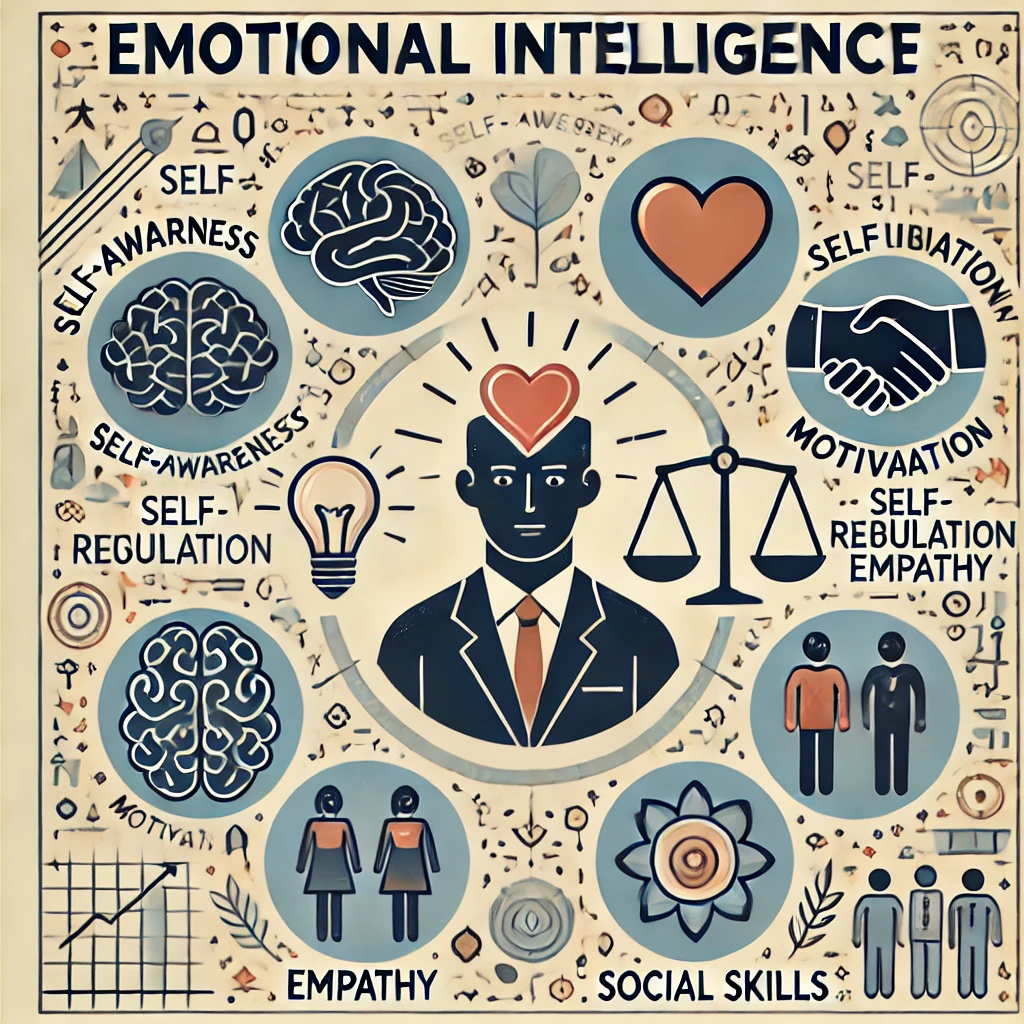The Role of Emotional Intelligence in Leadership
Emotional intelligence encompasses the ability to perceive, evaluate, and manage emotions both in oneself and in others. Those employed in leadership positions are able to drive their workers as well as manage various difficult interactions with the personnel positively. As organizations face rapid changes and challenges, the role of emotional intelligence in leadership becomes more critical than ever.(Görgens-Ekermans & Roux, 2021)
Emotional intelligence comprises five key components: self-awareness, knowledge, attitude, social and empathy, motivation and responsibility. Emotional intelligence enables leaders to be fully conversant with their emotions and how these have a bearing to the decisions they make. Self-regulation refers to controlling of emotions and desires to produce purposeful outcomes instead of a behavioural reaction. Meaning, motivation can be define as a process of wanting to achieve certain objectives under going through different problems that may arise. Compassionate allows leaders to grasp the emotions of others, this makes people trust and work with their leaders. Last but not least very constructive skills are all about interacting with people, persuading, negotiating and on the contrary escaping conflicts. Altogether, there are components that guarantee the presence of a potent influence in leadership. (Oh, 2021)
Leaders with high emotional intelligence can significantly influence their teams’ performance and morale. They foster open communication and encourage feedback, creating a supportive environment where team members feel valued. Research has shown that emotionally intelligent leaders are more effective in conflict resolution and decision-making, as they consider the emotional context of situations. This ability to navigate emotions not only enhances interpersonal relationships but also helps in recognizing and addressing team members' concerns before they escalate into larger issues.
Furthermore, these leaders can inspire and motivate their teams, leading to higher levels of engagement and productivity. They possess the skill to identify and leverage individual strengths, enabling them to delegate tasks effectively and create opportunities for personal growth. Emotional intelligence allows leaders to connect with their teams on a deeper level, fostering trust and loyalty.
Additionally, emotional intelligence contributes to better employee retention, as team members are more likely to stay in a positive and emotionally supportive work environment. Employees who feel understood and appreciated are less likely to seek opportunities elsewhere. By prioritizing emotional intelligence in their leadership development programs, organizations can cultivate effective leaders who drive success. This focus on emotional awareness not only enhances team cohesion but also aligns individual and organizational goals, ultimately contributing to a thriving workplace culture that promotes long-term sustainability and success. (El Othman et al., 2020)
Developing emotional intelligence requires intentional effort and practice. Organizations can implement training programs focused on emotional awareness and regulation, helping leaders identify their emotional triggers and learn coping strategies. Coaching can provide personalized feedback and support for leaders to enhance their EI skills. Additionally, encouraging reflective practices, such as journaling or mindfulness, can promote self-awareness and emotional regulation. Creating a culture that values feedback and open communication allows leaders to practice empathy and social skills in real time. Finally, organizations should model emotionally intelligent behaviour at all levels, reinforcing the importance of EI in leadership. By investing in emotional intelligence development, organizations can cultivate leaders who are better equipped to meet the challenges of modern workplaces. (Kimhy et al., 2020)
By understanding and managing emotions, leaders can foster a positive work environment that enhances team performance and engagement. The components of emotional intelligence—self-awareness, self-regulation, motivation, empathy, and social skills—are essential for navigating the complexities of interpersonal relationships in the workplace.
Self-awareness allows leaders to recognize their own emotional triggers and how their behavior impacts others, enabling them to approach situations thoughtfully. Self-regulation helps leaders maintain control over their emotions, particularly in high-pressure scenarios, ensuring they respond rather than react impulsively. Motivation drives leaders to pursue goals passionately, inspiring their teams to share in that enthusiasm and commitment.
Empathy enables leaders to understand and consider the feelings and perspectives of their team members, fostering a sense of belonging and respect. This connection cultivates trust, encouraging open dialogue and collaboration. Lastly, social skills are critical for effective communication and conflict resolution, allowing leaders to build strong relationships that facilitate teamwork and productivity.

As organizations continue to evolve, the emphasis on emotional intelligence in leadership will only grow, making it a key driver of organizational success. Leaders who prioritize and develop their emotional intelligence will be better positioned to inspire their teams and achieve lasting results. By investing in emotional intelligence training and creating a culture that values these skills, organizations can ensure their leaders are equipped to navigate challenges, drive innovation, and foster an inclusive environment where all employees can thrive. Ultimately, this commitment to emotional intelligence not only enhances individual and team performance but also positions the organization for sustainable growth in an increasingly complex business landscape. (Antonopoulou, 2024)
References
- Antonopoulou, H. (2024). The Value of Emotional Intelligence: Self-Awareness, Self-Regulation, Motivation, and Empathy as Key Components. Technium Education and Humanities, 8, 78-92. doi.org/10.47577/teh.v8i.9719 [ motivation, empathy]
- El Othman, R., El Othman, R., Hallit, R., Obeid, S., & Hallit, S. (2020). Personality traits, emotional intelligence and decision-making styles in Lebanese universities medical students. BMC psychology, 8, 1-14. doi.org/10.1186/s40359-020-00406-4 [emotional intelligence, decision-making]
- Görgens-Ekermans, G., & Roux, C. (2021). Revisiting the emotional intelligence and transformational leadership debate:(How) does emotional intelligence matter to effective leadership?. SA Journal of Human Resource Management, 19, 1279. doi.org/10.4102/sajhrm.v19i0.1279 [emotional intelligence, leadership]
- Kimhy, D., Lister, A., Liu, Y., Vakhrusheva, J., Delespaul, P., Malaspina, D., ... & Wang, Y. (2020). The impact of emotion awareness and regulation on psychotic symptoms during daily functioning. npj Schizophrenia, 6(1), 7. doi.org/10.1038/s41537-020-0096-6 [emotion awareness ,regulation]
- Oh, E. J. (2021). Mediating effect of communication ability on relationships among self-awareness, empathy, emotional intelligence and interpersonal competence of nursing students. Journal of Digital Convergence, 19(2), 549-560. doi.org/10.14400/JDC.2021.19.2.549 [self-awareness, empathy]